Sample Professional Reference Letters
-
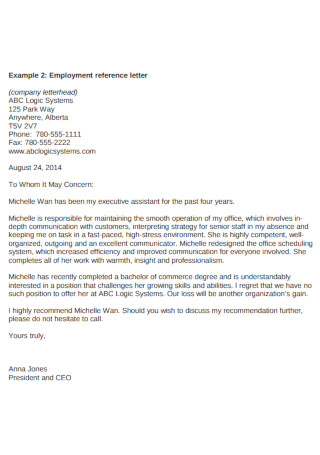
Sample Employment Reference Letter
download now -
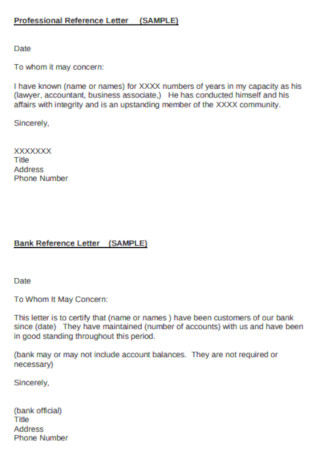
Professional Bank Reference Letter
download now -
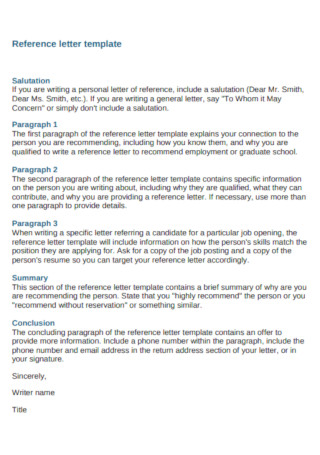
University Reference letter Template
download now -
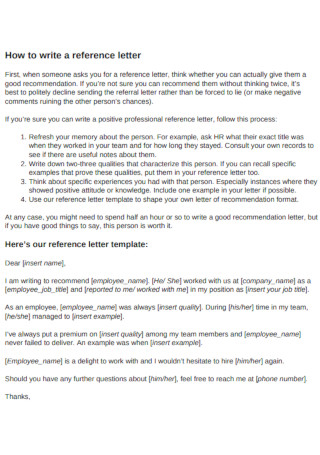
Sample Employee Reference Letter
download now -
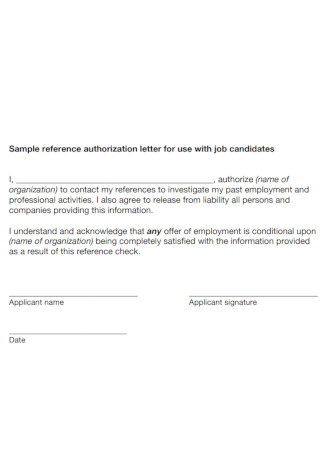
Sample Job Candidates Reference Letter
download now -
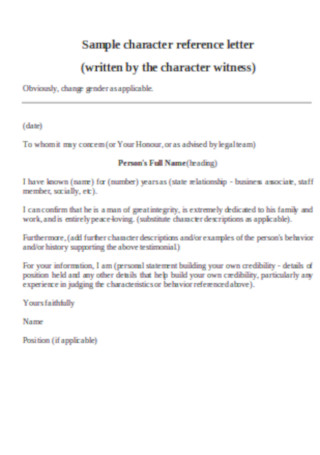
Sample Character Reference Letter
download now -
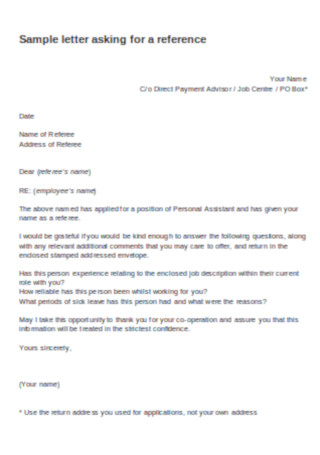
Sample Internship Reference Letter
download now -
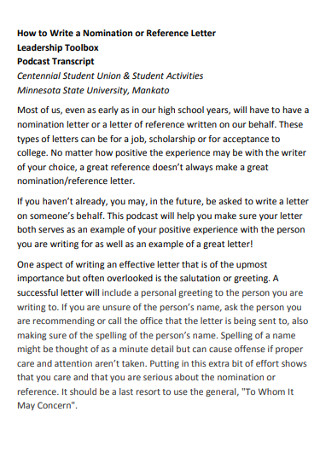
Personal nomination Reference Letter
download now -
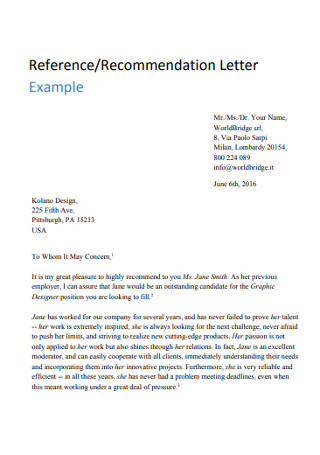
Sample Reference and Recommendation Letter
download now -
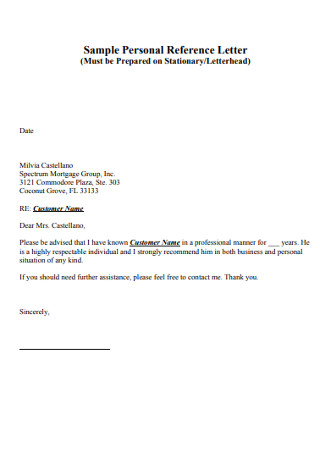
Sample Personal Reference Letter
download now -
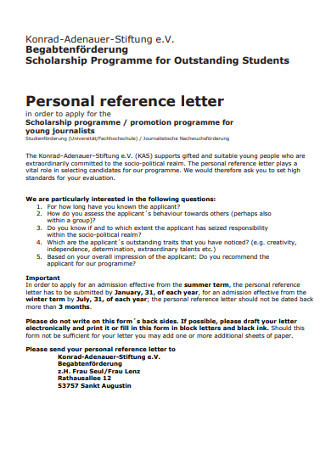
Student Personal Reference Letter
download now -
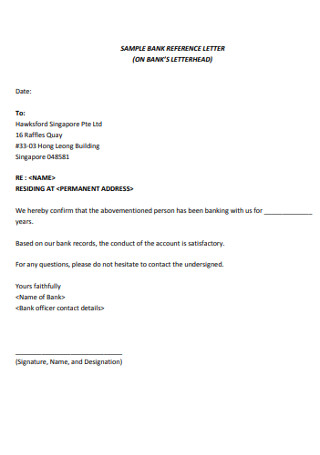
Sample Bank Reference Letter
download now -
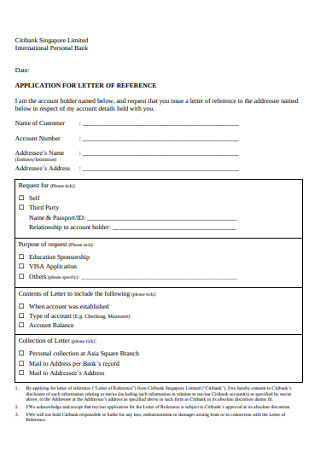
Reference Application Letter
download now -
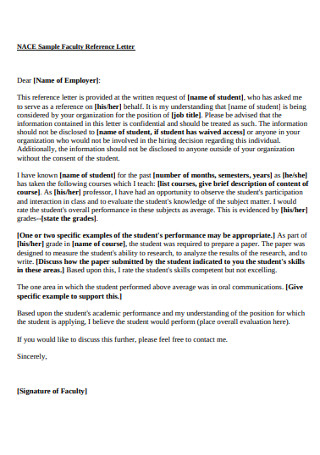
Sample Faculty Reference Letter
download now -
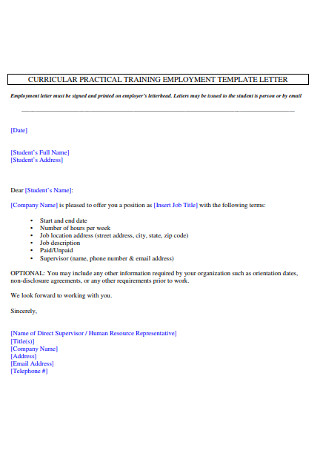
Employment Training Reference Letter
download now -
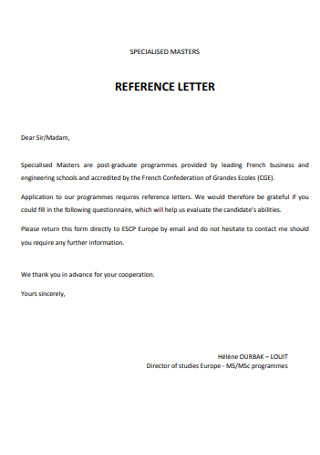
Specialised Master Reference Letter
download now -
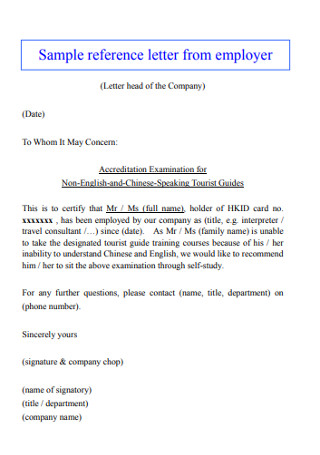
Sample Reference Letter From Employer
download now -
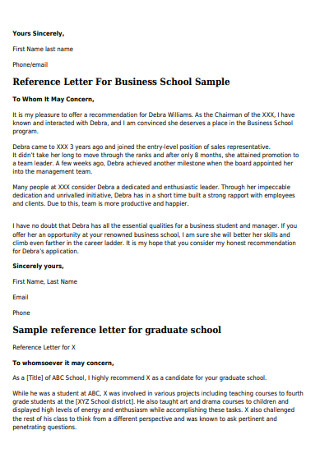
Sample Reference Letter For Business School
download now -
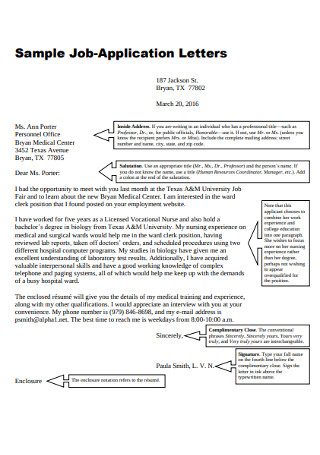
Sample Job-Application Reference Letters
download now -
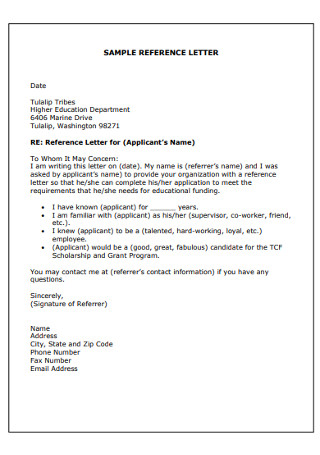
Education Employment Reference Letter
download now -
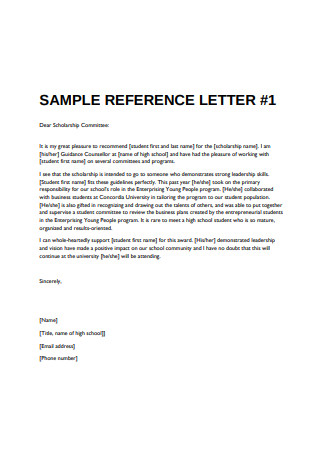
Sample Reference Letter
download now -
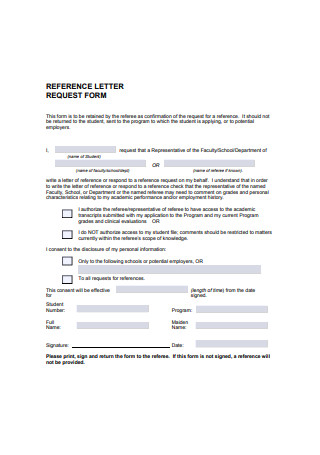
Basic Reference Letter Request Form
download now -
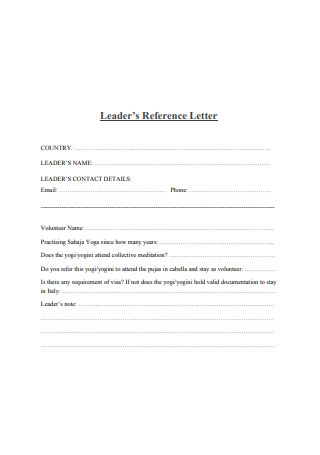
Basic Reference Letter
download now -
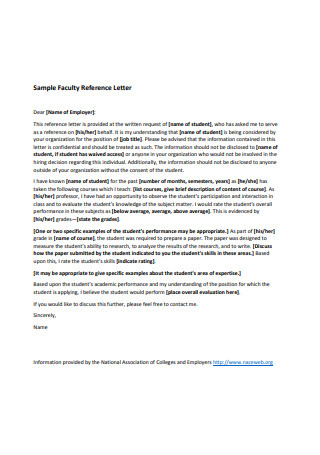
Sample Faculty Reference Letter
download now
FREE Professional Reference Letter s to Download
Sample Professional Reference Letters
Professional Reference Letter: What Is It?
What Makes a Professional Reference Letter Important?
The Anatomy of a Professional Reference Letter
Types of Professional Reference Letters
How to Write a Professional Reference Letter
FAQs
Who can be considered good professional references?
Can a friend write a professional reference letter for me?
How many references should I have on my resume?
Professional Reference Letter: What Is It?
A professional reference letter is a type of formal business letter where an employer, manager, or expert who knows a potential candidate very well writes about the said candidate’s job experience, work ethics, and other supporting details. What’s written in the reference letter should convince recruiters that a candidate deserves the title, especially when someone who can be trusted has made valid points about the candidate. And by “professional,” that means the person assigned to write it should be of a professional relationship with the candidate, not simply close friends or familial ties.
According to the Society for Human Resource Management (SHRM) 2017 research survey, 8 of 10 recruiters consider professional references in evaluating candidates.
What Makes a Professional Reference Letter Important?
Professional reference letters serve a purpose; they’re not just embellishments to beautify one’s employment application. And these are the most significant reasons that prove the importance of professional reference letters:
Helps Candidates Stand Out
Job openings prove to be tough and competitive among job seekers. And it only makes sense to have an extra edge to stand out from so many other applicants who submitted their job application forms. A professional reference letter can represent a candidate in more ways than just the experience and general background; the letter may open up about your character and other skills besides the ones in your resume.
Recruiters Value Professional References
SHRM’s 2017 survey said that 8 of 10 recruiters value professional references in assessing candidates. And that thought statement tells you that employers don’t easily trust an applicant through a resume alone. To do more such as being represented by an expert via a professional reference letter can certainly boost the chances of the candidate being hired.
A Detailed Document
Professional reference letters aka letters of recommendation have a lot of details to cover besides the names of candidates. The document tackles the candidate’s achievements, professional experience, skills, and even good moral character. And having one document to learn more about the potential candidate can help recruiters save time in screening; thus, a win-win for both candidates and recruiters.
Written by a Credible Professional
A professional reference letter is a reliable document because it is supposedly made by actual professionals who had experience working with the candidate being talked about in the letter. It’s not simply a personal reference letter where you are the best friend or family member of a candidate. Professional reference letters are written without bias so you have to be objective that you represent a candidate whom you trust can do well for a position.
The Anatomy of a Professional Reference Letter
What makes up a professional reference letter? Although these letters vary in content, purpose, and types (to be discussed later), there is actually a common format for how professional reference letters work. Refer to this guide on the basic parts of a professional reference letter:
Types of Professional Reference Letters
While it is clear what a professional reference letter is and why its intentions are good, it’s essential that you also understand the difference between one type of professional reference letter to another. And these are the basic types of professional reference letters you should know about:
Professional Reference Letter for Coworker
A professional reference letter for coworker is when you have worked with the candidate you are referencing in the letter before. Then, you write about your experience with that former employee to convince another employer that your colleague is worth hiring. This is basically the most common type of professional reference letter because it is used for work purposes and is also referred to as a job reference letter.
Professional Reference Letter for Admission to School
When the reference letter tackles academic concerns such as while applying to a graduate school, a teacher, or any educational purpose, you use a professional reference letter for admission. The purpose of this type is to make sure your candidate qualifies for school admission whether it involves a medical nurse, architecture, or law school letter of recommendation.
Professional Reference Letter for Apartment
A previous landlord or apartment owner typically prepares a professional reference letter for a former tenant who wishes to move to another apartment. Like landlord reference letters, the document entails how responsible the candidate used to be as a tenant whether it involves paying the rent on time, being an honest tenant, etc. There are other landlords with strict qualifications for their tenants and having this letter can definitely help tenants who move out.
Professional Reference Letter for Behavior
There are professional reference letters used for justifying the behavior, character, or sanity of a person for various purposes. Similar to a character reference letter, this type focuses on explaining the morals and character of a person and not so much on the professional background of the candidate. This is especially relevant for situations where organizations look for honest and well-mannered individuals rather than based on knowledge and experience only.
How to Write a Professional Reference Letter
After that whole introduction to the main types of professional reference letters, are you ready to write your own professional reference letter? Not to worry because you never have to build it from scratch. Just follow these steps on how to make a professional reference letter and you’re good to go:
Step 1: Evaluate if You Are Qualified to Talk about the Candidate
First things first, you should talk with the candidate who asked you to write a professional reference letter for her/him/them. Evaluate carefully if you are even qualified to write the letter. If you are just a friend or a family to the candidate, then that’s not a good look. It works best if you are the supervisor, employer, manager, team leader, or someone reputable who knows the candidate very well. Then, expect to review your knowledge about the applicant right from the start as you’ll be needed it in writing the formal letter later on.
Step 2: Refer to a Sample Professional Reference Letter as Your Guide
The reason you’ll find the process convenient in creating a professional reference letter is you can access the free sample templates here at Sample.net. Loads of premade sample professional reference letter templates are ready to download and customize, as seen in this post. Just choose a template that suits your liking and edit it according to your purpose.
Step 3: Label the Parts of a Professional Reference Letter
Review the anatomy of a professional reference letter, which was discussed previously. And make sure your letter consists of the letterhead, and recipient’s details, down to the complimentary close and signature line. If there is a need to add more parts such as supporting business documents for proof about the candidate, you may do so. Just make sure all your details are written in an organized manner.
Step 4: Be Objective towards Your Candidate
Honesty is always a policy in writing professional reference letters. Although the intention is that your candidate will have a glowing impression on the recruiter, you can’t make up lies just to keep your candidate hired. Be truthful about the candidate’s accomplishments, character, and most importantly, how you experienced working with her/him/them. Lying in the letter will eventually be discovered and it will not only bring a bad reputation to the candidate but also to you as the writer or the supposed-to-be reputable expert who knows the candidate.
Step 5: Keep It Straightforward and Professional
Focus on the term “professional” because that’s what you’re supposed to observe while making the professional reference letter. That means you can say what needs to be said about the candidate without giving flowery words and unnecessary information. Also, keep it short because not all employers have the time to read lengthy employment letters. And finally, review your work until you are confident to submit that letter to the recipient as early as possible.
FAQs
Who can be considered good professional references?
Professional references are typically experienced professionals such as former employers, managers, team leaders, supervisors, clients, coaches, or professors; it depends on the purpose of your reference too.
Can a friend write a professional reference letter for me?
Yes, a friend or a family member can be your referee; however, it isn’t exactly recommended because employers may assume the letter would be biased since you are close to the friend or family member.
How many references should I have on my resume?
In writing a resume, expect to provide at least three references; however, it’s okay if you have less than three referees if you are still new or just had a few jobs before.
Doors of opportunity are opened using the keys known as professional reference letters. And to be assigned to write such a detailed letter is both a blessing (that the candidate has chosen you) and a challenge (that you have to write honest details about the candidate to convince an employer). So take advantage of the sample professional reference letter templates to have a seamless experience in writing and submit a riveting letter.
